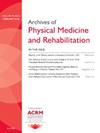Building Context-Aware Digital Health Tools: A Framework for Evaluating Real-World Human Health and Behavior
IF 3.6
2区 医学
Q1 REHABILITATION
Archives of physical medicine and rehabilitation
Pub Date : 2025-05-01
DOI:10.1016/j.apmr.2025.03.030
引用次数: 0
Abstract
Digital health tools that utilize innovative technologies (wearable / portable devices, human-centric artificial intelligence / machine learning [AI / ML], etc.) have enormous potential for targeted human performance monitoring, pain, disease, and/or disability management. Efforts in this space have, for the most part, yet to translate into clinically useful applications. For every potential opportunity that these tools present, challenges persist, including how to devise experimental protocols in unconstrained, real-world settings to ensure that meaningful data is captured, how to make sense of those data / reconcile with what we observe in the laboratory, and how best to integrate these insights within the clinical ecosystem. In this presentation, I discuss the generalized framework our team (EPIC Laboratory) has been developing that supports proactive planning for, anticipation of, and adaptation to real-world human behavior, with a specific emphasis on the principles of human movement and cognitive science, contextual design, and user experience evaluation as applied to engineering design and product development.
构建环境感知数字健康工具:评估现实世界人类健康和行为的框架
利用创新技术(可穿戴/便携式设备、以人为中心的人工智能/机器学习[AI / ML]等)的数字健康工具在有针对性的人体性能监测、疼痛、疾病和/或残疾管理方面具有巨大潜力。在这一领域的努力,在很大程度上,尚未转化为临床有用的应用。对于这些工具提供的每一个潜在机会,挑战仍然存在,包括如何在不受约束的现实环境中设计实验方案,以确保捕获有意义的数据,如何理解这些数据/与我们在实验室中观察到的结果相一致,以及如何最好地将这些见解整合到临床生态系统中。在这次演讲中,我将讨论我们的团队(EPIC实验室)一直在开发的广义框架,该框架支持对现实世界人类行为的主动规划、预测和适应,并特别强调人类运动和认知科学、情境设计和应用于工程设计和产品开发的用户体验评估的原则。
本文章由计算机程序翻译,如有差异,请以英文原文为准。
求助全文
约1分钟内获得全文
求助全文
来源期刊
CiteScore
6.20
自引率
4.70%
发文量
495
审稿时长
38 days
期刊介绍:
The Archives of Physical Medicine and Rehabilitation publishes original, peer-reviewed research and clinical reports on important trends and developments in physical medicine and rehabilitation and related fields. This international journal brings researchers and clinicians authoritative information on the therapeutic utilization of physical, behavioral and pharmaceutical agents in providing comprehensive care for individuals with chronic illness and disabilities.
Archives began publication in 1920, publishes monthly, and is the official journal of the American Congress of Rehabilitation Medicine. Its papers are cited more often than any other rehabilitation journal.

 求助内容:
求助内容: 应助结果提醒方式:
应助结果提醒方式:


